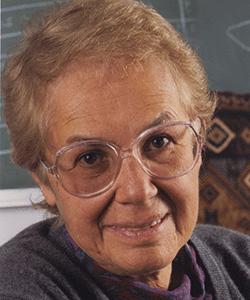Janellen Huttenlocher
 University of Chicago (retired)
University of Chicago (retired)
William James Fellow Award
In a remarkable career, Janellen Huttenlocher has published on a range of research topics, including language, spatial coding in adults and children, quantitative development, and memory. She is a major figure, both within these subfields and in psychology at large.
Huttenlocher has been particularly interested in the role of the child’s environment in the development of cognitive skills. One of her most famous findings is that the verbal behavior of parents and teachers not only determined children’s vocabulary growth, but also their grammatical learning.
Her more recent work focused on the effects of early input on children’s syntactic development. By showing that there are variations in the input children receive, these inputs affect their levels of comprehension, she found. This work has important implications on how to increase children’s language competence.
Huttenlocher has also conducted research on conceptual representation and memory, including the role of concepts in people’s memories of events. She has found, for example, that people place an event within different chunks of time, like a time of day or day of the week, with each chunk considered separately. Her research reveals that if people are uncertain of an event’s position within a chunk of time, they err toward the middle; asked what day they had been visited by an interviewer four days to 75 days earlier, the errors tended to run toward Wednesday. But they were able to distinguish whether the visit occurred on a weekday or weekend.
Professor Huttenlocher also has influenced generations of young psychologists through her mentorship and teaching. Her contributions to the future of psychology have been far-reaching and profound.





APS regularly opens certain online articles for discussion on our website. Effective February 2021, you must be a logged-in APS member to post comments. By posting a comment, you agree to our Community Guidelines and the display of your profile information, including your name and affiliation. Any opinions, findings, conclusions, or recommendations present in article comments are those of the writers and do not necessarily reflect the views of APS or the article’s author. For more information, please see our Community Guidelines.
Please login with your APS account to comment.